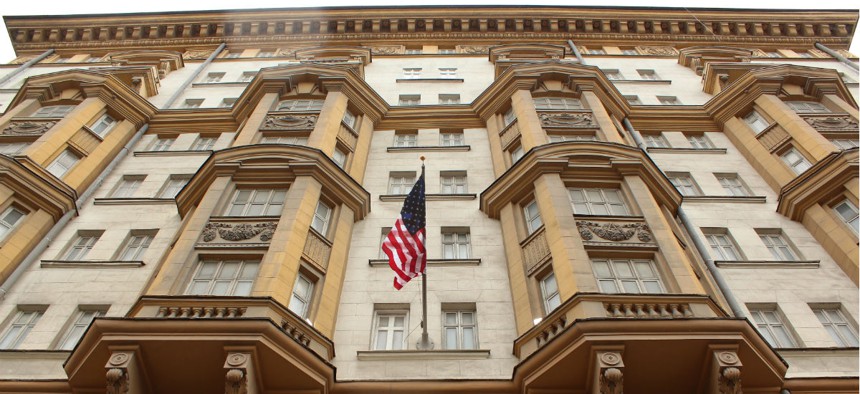
the US Consulate in Moscow. Nikitriy/Shutterstock.com
Foreign Service Veterans Aren't Alarmed by Trump’s Recall of Envoys
But the President-elect’s edict to remove all politically appointed ambassadors by Jan. 20 is unusual.
The newly reported move made last month by the Trump transition team to recall all politically appointed U.S. ambassadors by Jan. 20 prompted consternation among some diplomats, as reported Thursday night by the New York Times.
But despite grumblings over sudden changes in plans for housing and children’s schooling, the directive—which does not apply to the roughly 70 percent of ambassadors who are career Foreign Service—veteran diplomats consulted by Government Executive said they are not alarmed.
The Times story, citing unnamed diplomats familiar with the plan, said the move meant “breaking with decades of precedent by declining to provide even the briefest of grace periods,” and quoted several Foreign Service observers calling the move vindictive. And the news story said the decision “threatens to leave the United States without Senate-confirmed envoys for months in critical nations like Germany, Canada and Britain.”
Trump spokespersons were quoted saying there was no ill will in the move and that it should come as no surprise.
Amb. Barbara Stephenson, president of the American Foreign Service Association, said via email, “We go through this process every time there is a change of administration. Political appointees are generally expected to prepare for departure around the time a new president is inaugurated, particularly if there is a change of party. We understand the new administration is adhering strictly to a no-extensions policy, which is not always the case.
“It’s important to point out that embassies have a deputy chief of mission, a career diplomat who serves as chargé d’affaires until a new ambassador is confirmed. That person is always a career Foreign Service officer, typically with decades of experience, and is selected with the expectation that he or she is fully up to the task of running an embassy.”
One veteran diplomat recalled a president he declined to name who required all political ambassadors to return before he took the oath of office.
Ambassador Thomas Pickering, who has been the U.S. envoy to such hotspots as Russia, Israel and India, said, “It is a little unusual to rush people out of the country when they have personal hardships, children’s education or illness,” he said. But the Trump directive gave nearly a month’s notice, even though there is usually a grace period, he added.
But Trump can’t expect to have replacements in place very quickly given the Senate’s record of both parties dragging out the confirmation process, Pickering noted. “Through a long tradition of diplomacy, the senior most person in the embassy, the deputy chief of mission, fills in, even when the ambassador is gone temporarily or during a hiatus,” he said.
“That doesn’t mean things aren’t covered. But when those holding the rank of ambassador—confirmed by the Senate and representing the president of the United States—are not present, the value of having that individual’s qualities is not there.”







